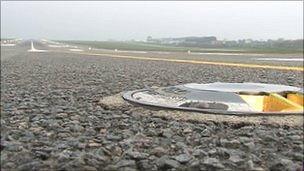Guernsey runway barrier system 'more costly'
- Published

The project to improve the runway already approved by the States has a price tag of £81m
Building a special barrier to stop planes overshooting Guernsey Airport's runway would cost £6m more than a safety area extension, consultants say.
Mott MacDonald also found the airfield boundaries would still need extending if a barrier was built.
This plan was found to be the cheapest of the options looked at by the review.
A debate on the compulsory purchase of land needed to extend the safety areas was delayed last month until this report was published.
Mott MacDonald was asked to assess various options and identify whether these would meet regulatory standards and what the associated costs would be.
The options included using the EMAS (Engineered Arresting Systems Corporation) system, which is produced by US company Zodiac and uses crushable concrete to bring aircraft overrunning the end of the runway to a stop, as well as the extended grass runway end safety area plan approved by the States in 2009.
One of the alternatives looked at the possibilities of grass safety areas without the need for the compulsory purchase of land.
The consultants found the necessary safety areas could be achieved without the compulsory purchase of land, but it would increase costs by about £1.5m and involve moving the runway further west than currently planned.
It concluded the improvements to the safety areas were essential and could not be achieved within the existing airport boundaries without shortening the runway, which it said would have "a significant and unacceptable effect on commercial air transport operations".
'Urgent and essential'
Graham Ruddock, from the consultants, said there was no clear recommendation as each option had its benefits, but entailed additional costs.
The Public Services Department, which is behind the proposed improvement work, welcomed the report.
Minister Bernard Flouquet said: "There have been accusations the department has not considered alternatives, particularly in light of recent developments as far as EMAS is concerned.
"I hope this independent review reassures islanders that has not been the case, and Public Services has in fact not only considered various options, but has maintained an open mind.
"We have never doubted that EMAS is an effective system, but we can meet the appropriate safety provisions without incurring millions of pounds in additional costs EMAS would entail."
He added: "This project is now both urgent and essential to the future economic well-being of the island, and any further delay could be very costly."
- Published1 February 2011
- Published28 January 2011
- Published26 January 2011
- Published19 January 2011
- Published14 January 2011
- Published20 December 2010